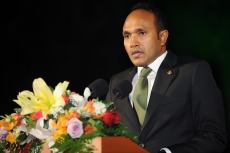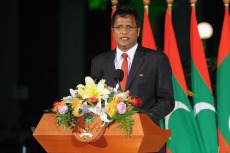The government held an event inaugurated by Vice President Mohamed Jameel Ahmed at the Republican Square on Wednesday night to mark the Maldives’ 440th National Day.
The day is marked to celebrate the anniversary of the country’s independence from the Portugese invasion.
Members of the cabinet, foreign dignitaries, members of independent commissions as well as the security forces attended the event.
President Abdulla Yameen Abdul Gayoom – who is currently in India on his first official trip abroad after assuming office in November 2013 – also gave a pre-recorded national address via the state broadcaster on the occasion.
In his address, the President stated no individual must be allowed the opportunity to take away the nation’s peace for political purposes or to gain personal benefit.
While it is important to view every citizen as a stakeholder in matters of the country, people should not be given the chance to challenge nationalism or conduct any activity that may threaten independence and sovereignty in the guise of freedom of expression or through differences in political opinions, Yameen continued.
“We must instill the spirit of nationalism in the younger generations who will inherit this country in future. The moral we must take away from National Day is for those in power and leading the country, citizens and all responsible leaders to raise national and community interest over personal interest as we work to overcome challenges. This is the example set by Mohamed Thakurufaanu [Maldivian ruler who saved the country from the Portuguese conqueres who ruled the country from 1558 to 1573]. This is the true meaning of his jihad in national interest back on that day,” Yameen stated.
“We must repeat the work our ancestors conducted in rain and shine. The reason we are to take breaths of independence today is due to the glorious jihad and sacrifices they made then for the sake of gaining independence. The country will not be able to take breaths of independence tomorrow unless we succeed in doing major work to overcome economic slavery and establish economic contentment,” he continued.
He pledged to fulfil his term serving all citizens equally and justly.
“I will make this government into one that is kind to its people, and loved by the people. I will bring swift changes as is desired by people and take the Maldives into a new era of development. My team and I will not be deterred in our work regardless of how rough the political seas we must cross become,” he concluded his address.
 National Pride
National Pride
“The spirit of nationalism can be maintained in its purest form only when social justice is established in the country,” Vice President Jameel said, speaking at Wednesday’s event.
The current government would work following the example set by Mohamed Thakurufaanu, Jameel said and called on citizens to protect the country’s independence and sovereignty.
“True nationalism can only be experienced with the improvement of living standards, and the country develops its health and education sectors,” he said.
“The nation must today be covetous of its national pride, of increasing self-sufficience, and should not let go of the national character. Today, if one has love for nationalism, one will not damage the country’s social fabric. One will not give away the country’s economic power into the hands of a foreign party. They will not sell off the national identity to a foreign group with no consideration towards national pride just for political gain. They will not let things go to the point where the country is stripped of the right to speak up about its own internal matters,” Jameel continued.
He appealed to the public to ensure that no one allows any other person to “damage the brotherly bonds between us in the name of establishing democracy, or in things that arise from differences in opinion, or any other cause”.
He then said that the day emphasizes the bridge between nationalism and islam in the country, adding that thus what must be given highest priority is the strengthening religious faith.
“Psychological war against religion, nationalism”
Home Minister Umar Naseer warned in his speech at the same event that there is an “ongoing psychological war aiming to lead astray our faith in Islam, and break up our ties of nationalism, a war that is escalating at a very fast speed”.
He stated that while this is a global danger, the Maldives is not far removed from being in its “line of fire”. Stating that the currently is already being affected by it, he appealed to all Maldivians to refrain from joining the “war” against the nation.
“For a Maldivian son to become a slave of this psychological war is like a cancer cell forming in the body of this nation. It is a huge danger,” he stated.
“It is important to become more independent in the country’s development work, and to give up depending on foreign labourers. There is no reason that the sons of fathers who scraped moss off the underside of fishing boats have to depend on a foreigner just to dust off their motorcycles,” the Home Minister said.
“Ours is a blessed land. It is a land that breeds heroes. Every time a foreign power has tried to meddle with our independence or our Islamic faith, Maldivian soil has brought out heroes that will cause the whole world to step back from,” Umar stated.
Irreligious acts are common today: Adhaalath Party
Religious conservative Adhaalath Party has also released a statement today, extending greetings on the occasion.
The statement spoke of the heroic events of Mohamed Thakurufaanu who had “slain the Portugese commander who had tried to force alcohol down the throats of pious Maldivians”, and then proceeded to compare heroes of the past with present day Maldives.
“The biggest difference is the mentality of Maldivians then and the mentality of Maldivians today. Then, when attempts were made to force alcohol down their throats, they resisted. Yet today, alcohol and narcotics is an epidemic which is alarmingly common among Maldivians,” it read.
“Then the Portuguese tried to force other religions unto Maldivians. Yet today, irreligious acts against Islamic norms are abundantly observed among Maldivians. This is not something the government can deal with by making it the mandate of a specific ministry, but a goal that all institutes must unite to reach.”